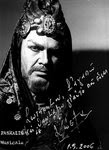"...In particular, there's so much going on in Fleming's interpretation that the connoisseur could not help but be intrigued by what she brings to the role of Violetta.
~
The soprano's charisma on the stage is truly magical – she looks dazzling in Bob Crowley's costumes, which we've been so used to seeing worn by dark-haired divas like Gheorghiu and Netrebko – and one simply can't take one's eyes from her. She also uses her instrument with the utmost flexibility, sometimes scaling down to the smooth and soft (as in the exquisite 'Parigi, o cara') and sometimes really letting rip (such as in the first scene of the second act). And she foreshadows Violetta's death extremely vividly by coughing especially loudly during all three acts, though the demise is also done gradually so that - unlike some other divas in the role - the curtain doesn't go up on Act 3 with the scene of a Violetta who's already practically dead, since Fleming's Violetta is a real fighter.
~

Hampson's passionate, elegant, powerful delivery rang loudly through the house and drew ecstatic applause from the audience at the final curtain... "

"...Calleja, meanwhile, has never performed better at Covent Garden: he remains a wooden actor during the more passionate scenes, but the way he swaggers about and throws the casino chips at Violetta in Act 2, Scene 2 totally suits the character. His voice has gained a new gravity, too, and if I'm still not completely enthusiastic about his fast vibrato style, the security of line and relaxed stance he took made his singing a pleasure. It was a surprise, in fact, when he sang only one verse of 'O mio rimorso' and did not take the high C, since he seemed so much in command of what he was doing...."
Photos by Catherine Ashmore
Seckerson for The Independent:
"...The latest and most mature to do so is the American superstar Renee Fleming and what she has that singers like Gheorghiu and Netrebko before her did not is a wealth of experience and stylistic know how. Alright, so the words are too often sacrificed to the sound and the sound, borne as it is on extraordinary and effortless breath control, is, one could argue, so glamorous as to seem self-regarding. But what a sound it is and how – in true bel canto fashion – it shapes and defines the emotion. The little hairpin dynamics, the wistful portamenti, the way in her climactic act one aria she takes time to savour the “mysterious”, “exalted” tone of the music culminating in a real (and properly ecstatic) trill. Her chest register has more attitude now, too, and there is rage in her demise, the words “It’s too late” rasping with defiance.
Experience and authority fleshed out act two more than one can say with even the young head on old shoulders of Joseph Calleja displaying fabulous maturity. What a distinctive quality this warm and engaging voice has, the flutter of rapid vibrato lending a wonderfully inviting quality to his ample middle range. Then the gaunt and commanding father figure of Thomas Hampson (Giorgio Germont) whose confrontation with Violetta achieved an agonising intensity. Fleming’s numbing pianopianissimo as she agreed to leave Alfredo for the sake of his sister was quite simply great dramatic singing – and how it heightened the impact of the great release “Amami, Alfredo” minutes later..."

Christiansen for the Telegraph:
"...But La traviata is something she finds tougher, as anyone would – it's often been said that Verdi had a different vocal type in mind for each of the three acts, and the emotional variety packed into the role of Violetta isn't easy to unravel.
In the party fizz of the first scene, Fleming certainly sounded uncomfortable and underpowered: she was outsung by her Alfredo in both duets, and the coloratura of "Sempre libera" put her under pressure, not helped by a conductor, Antonio Pappano, with whose tempi she clearly disagreed.
Joseph Calleja was the most endearing of Alfredos, singing with fresh, forthright, vibrant tone, and as Germont Thomas Hampson gave a masterly account of that dreary old aria "Di Provenza il mar"..."




















.jpg)





















No comments:
Post a Comment